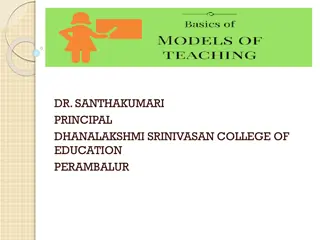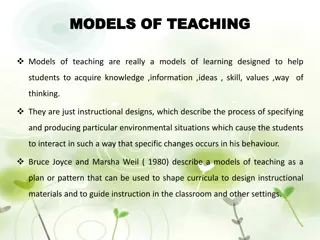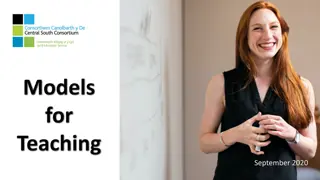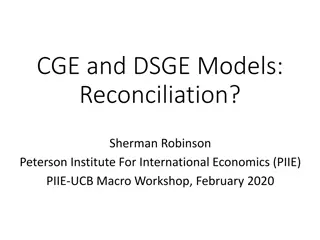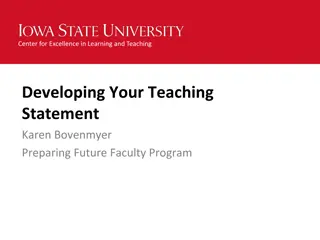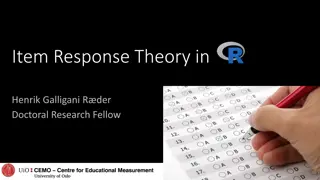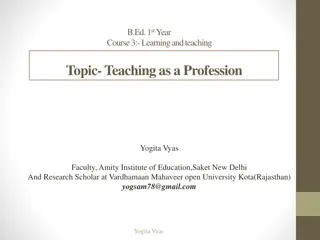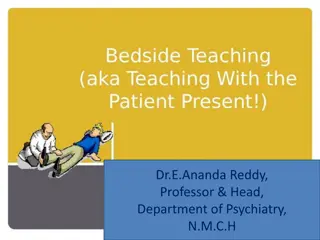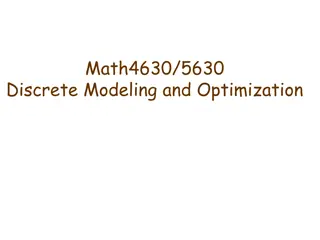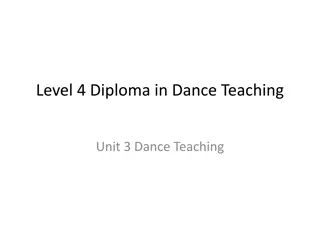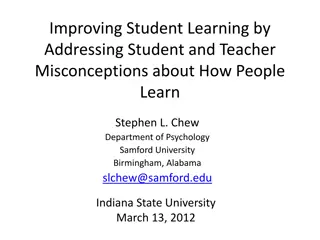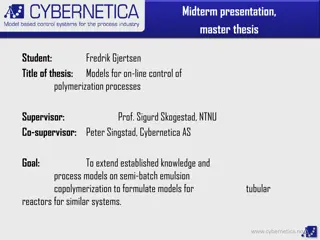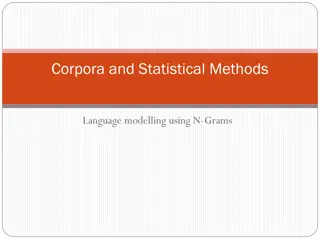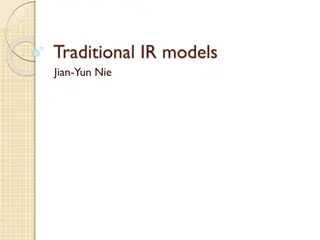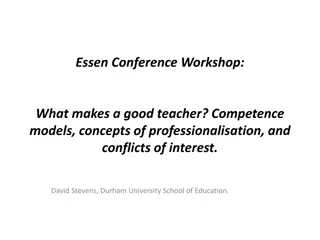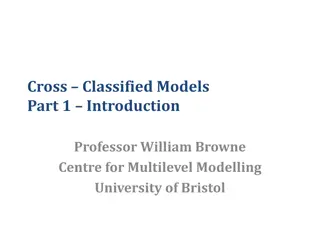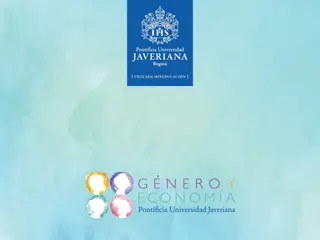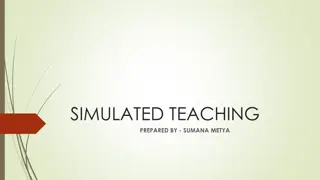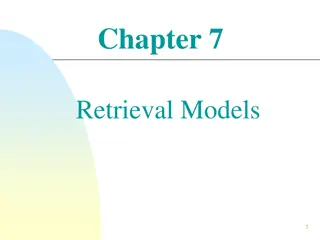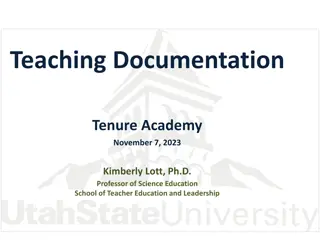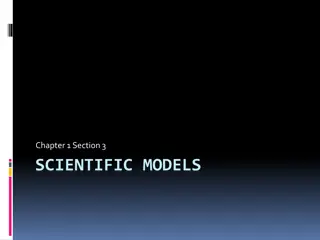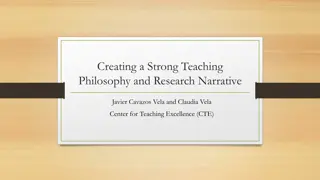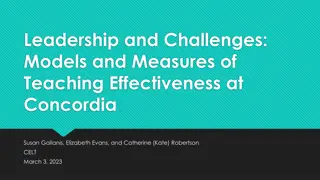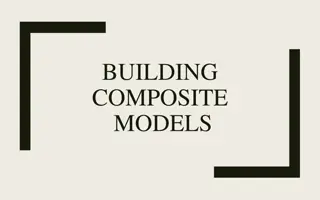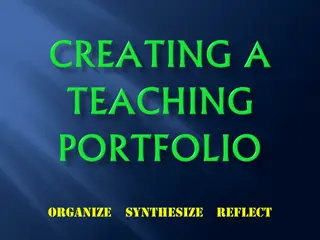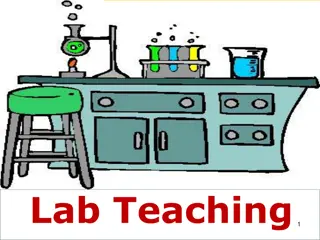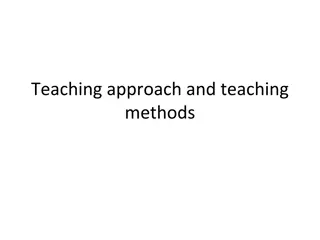Global Climate Models
Scientists simulate the climate system and project future scenarios by observing, measuring, and applying knowledge to computer models. These models represent Earth's surface and atmosphere using mathematical equations, which are converted to computer code. Supercomputers solve these equations to pr
3 views • 15 slides
System Models in Software Engineering: A Comprehensive Overview
System models play a crucial role in software engineering, aiding in understanding system functionality and communicating with customers. They include context models, behavioural models, data models, object models, and more, each offering unique perspectives on the system. Different types of system
3 views • 33 slides
Understanding Input-Output Models in Economics
Input-Output models, pioneered by Wassily Leontief, depict inter-industry relationships within an economy. These models analyze the dependencies between different sectors and have been utilized for studying agricultural production distribution, economic development planning, and impact analysis of i
8 views • 7 slides
Exploring Physical Geography Models and Theories
Engage in an active discussion concerning the teaching and learning of physical geography, focusing on various models, including the Bradshaw model. Learn about the importance and usage of models in physical geography education, their impact on student learning, and the essence of models in teaching
8 views • 22 slides
Teaching Observation Process and Best Practices
Explore the teaching observation process with a focus on fostering faculty success and improving teaching practices. Learn about pre-observation meetings, separating observation from evaluation, and utilizing observations to spark dialogue about effective teaching. Access resources such as the Teach
7 views • 20 slides
Understanding Models of Teaching in Education
Exploring different models of teaching, such as Carroll's model, Proctor's model, and others, that guide educational activities and environments. These models specify learning outcomes, environmental conditions, performance criteria, and more to shape effective teaching practices. Functions of teach
2 views • 20 slides
Understanding Models of Teaching for Effective Learning
Models of teaching serve as instructional designs to facilitate students in acquiring knowledge, skills, and values by creating specific learning environments. Bruce Joyce and Marsha Weil classified teaching models into four families: Information Processing Models, Personal Models, Social Interactio
1 views • 28 slides
Models for High-Quality Teaching: A Comprehensive Overview
Improving education is a critical national mission, emphasizing universal access to essential experiences and skills. Quality teaching is highlighted as a powerful lever in enhancing learner attainment. Various teaching models are explored to support consistency and effectiveness in educational prac
2 views • 33 slides
Significance of Models in Agricultural Geography
Models play a crucial role in various disciplines, including agricultural geography, by offering a simplified and hypothetical representation of complex phenomena. When used correctly, models help in understanding reality and empirical investigations, but misuse can lead to dangerous outcomes. Longm
0 views • 8 slides
Understanding CGE and DSGE Models: A Comparative Analysis
Explore the similarities between Computable General Equilibrium (CGE) models and Dynamic Stochastic General Equilibrium (DSGE) models, their equilibrium concepts, and the use of descriptive equilibria in empirical modeling. Learn how CGE and DSGE models simulate the operation of commodity and factor
4 views • 15 slides
Developing Your Teaching Statement for Future Faculty Program
Participate in a video session hosted by the Center for Excellence in Learning and Teaching to learn about creating teaching statements. The session guides you through prompts to stimulate your thinking and help you draft your statement step by step, covering topics like best practices for writing t
0 views • 20 slides
Enhancing Information Retrieval with Augmented Generation Models
Augmented generation models, such as REALM and RAG, integrate retrieval and generation tasks to improve information retrieval processes. These models leverage background knowledge and language models to enhance recall and candidate generation. REALM focuses on concatenation and retrieval operations,
1 views • 9 slides
Understanding Item Response Theory in Measurement Models
Item Response Theory (IRT) is a statistical measurement model used to describe the relationship between responses on a given item and the underlying trait being measured. It allows for indirectly measuring unobservable variables using indicators and provides advantages such as independent ability es
2 views • 32 slides
Importance of Teaching English at Different Education Levels
English language holds a significant position in the educational system and national life of India. This presentation by Dr. A. Mary Delphine highlights the aims and objectives of teaching English, emphasizing its importance in India and the modern world. The objectives include understanding the rat
1 views • 32 slides
Co-Teaching in Student Teaching: A Collaborative Approach
Co-teaching in student teaching involves mentor teachers and student teachers working together to plan, deliver, and assess instruction while sharing responsibilities and opportunities for collaborative pedagogy. It is a model that enhances student learning by engaging two teachers actively in the c
0 views • 21 slides
Understanding Teaching as a Profession by Yogita Vyas
Explore the comprehensive module by Yogita Vyas focusing on the nature of teaching, characteristics of effective teaching, importance of teaching as a profession, and qualities of a professional teacher. Gain insights into the teaching profession, its role in society, and the essential skills requir
1 views • 27 slides
Principles and Strategies for Effective Bedside Teaching in Clinical Settings
Explore the key concepts of bedside teaching in clinical rounds, focusing on patient-centered education, principles of adult learning, and strategies for effective teaching. Learn about the importance of clear objectives, active involvement, and feedback in the teaching process. Discover where bedsi
1 views • 33 slides
Understanding Discrete Optimization in Mathematical Modeling
Discrete Optimization is a field of applied mathematics that uses techniques from combinatorics, graph theory, linear programming, and algorithms to solve optimization problems over discrete structures. This involves creating mathematical models, defining objective functions, decision variables, and
0 views • 12 slides
Level 4 Diploma in Dance Teaching Unit 3 Overview
In Level 4 Diploma in Dance Teaching Unit 3, the focus is on dance teaching practice. The learner is observed teaching a class, supported by written evidence such as teaching logs and lesson planning. Continuous Professional Development activities are also emphasized. The examination involves teachi
0 views • 8 slides
Addressing Misconceptions in Teaching and Learning
Explore how misconceptions about learning impact teaching effectiveness and student performance. Learn how cognitive research can enhance teaching methods. Discover the importance of accurate knowledge for effective teaching. Identify common beliefs that hinder teaching effectiveness and student lea
0 views • 40 slides
Observational Constraints on Viable f(R) Gravity Models Analysis
Investigating f(R) gravity models by extending the Einstein-Hilbert action with an arbitrary function f(R). Conditions for viable models include positive gravitational constants, stable cosmological perturbations, asymptotic behavior towards the ΛCDM model, stability of late-time de Sitter point, a
1 views • 12 slides
Understanding Wireless Propagation Models: Challenges and Applications
Wireless propagation models play a crucial role in characterizing the wireless channel and understanding how signals are affected by environmental conditions. This article explores the different propagation mechanisms like reflection, diffraction, and scattering, along with the challenges and applic
1 views • 14 slides
Models for On-line Control of Polymerization Processes: A Thesis Presentation
This presentation delves into developing models for on-line control of polymerization processes, focusing on reactors for similar systems. The work aims to extend existing knowledge on semi-batch emulsion copolymerization models, with a goal of formulating models for tubular reactors. Strategies, ba
0 views • 16 slides
Understanding N-Gram Models in Language Modelling
N-gram models play a crucial role in language modelling by predicting the next word in a sequence based on the probability of previous words. This technology is used in various applications such as word prediction, speech recognition, and spelling correction. By analyzing history and probabilities,
0 views • 101 slides
Teaching Staff Digital Experience Insights Survey Results 2020-21
This presentation provides insights from the Teaching Staff Digital Experience Insights Survey for the year 2020-21. It focuses on key metrics related to technology at the organization, technology in teaching, and the development of digital skills among teaching staff. The survey collected feedback
2 views • 26 slides
Understanding Information Retrieval Models and Processes
Delve into the world of information retrieval models with a focus on traditional approaches, main processes like indexing and retrieval, cases of one-term and multi-term queries, and the evolution of IR models from boolean to probabilistic and vector space models. Explore the concept of IR models, r
0 views • 65 slides
Exploring Competence Models and Professionalization in Teaching: Perspectives and Challenges
Unpacking the essence of a good teacher, this workshop delves into competence models, professionalization concepts, and conflicts of interest in teaching. It contrasts competence-based and holistic approaches in teacher education, discussing tensions between complexity in teaching and the need for a
0 views • 9 slides
Understanding Cross-Classified Models in Multilevel Modelling
Cross-classified models in multilevel modelling involve non-hierarchical data structures where entities are classified within multiple categories. These models extend traditional nested multilevel models by accounting for complex relationships among data levels. Professor William Browne from the Uni
0 views • 13 slides
Understanding General Equilibrium Models and Social Accounting Matrices
General Equilibrium Models (CGE) and Social Accounting Matrices (SAM) provide a comprehensive framework for analyzing economies and policies. This analysis delves into how CGE models help simulate various economic scenarios and their link to SAM, which serves as a key data input for the models. The
0 views • 50 slides
Understanding Simulated Teaching for Effective Classroom Training
Simulated teaching is a powerful training technique that uses role-playing to change student behavior. It helps student teachers practice teaching skills in artificial scenarios before real classroom situations. This method allows for effective feedback, easy implementation, and the opportunity to r
0 views • 11 slides
Understanding Retrieval Models in Information Retrieval
Retrieval models play a crucial role in defining the search process, with various assumptions and ranking algorithms. Relevance, a complex concept, is central to these models, though subject to disagreement. An overview of different retrieval models like Boolean, Vector Space, and Probabilistic Mode
0 views • 56 slides
Teaching Documentation Workshop: Enhancing Research and Teaching Practices
Explore the Teaching Documentation Workshop focusing on improving research and teaching methodologies. Delve into the essentials of documenting research and teaching activities along with mentorship opportunities and workshop schedules.
0 views • 16 slides
Understanding Scientific Models and Their Applications
Explore the world of scientific models through this informative content covering physical, mathematical, and conceptual models. Discover why models are used in science, their types, and potential limitations. Delve into the importance of utilizing models to comprehend complex concepts effectively.
0 views • 21 slides
USC Teaching Excellence Initiative Progress Report
The USC Teaching Excellence Initiative highlights progress in developing a School Teaching Plan with five key elements, focusing on faculty-led processes, defining teaching excellence, supporting faculty development, evaluating teaching excellence, and rewarding outstanding performance. The Center f
0 views • 6 slides
Crafting a Strong Teaching Philosophy & Research Narrative Workshop
This workshop explores the key areas and structure of a statement of teaching philosophy, aiming to enhance participants' ability to evaluate and improve their teaching and research philosophies. Participants will reflect on personal beliefs, values, and strategies to create an effective teaching ph
0 views • 15 slides
Enhancing Teaching Effectiveness: Models and Measures for Academic Excellence
Explore the essential elements and criteria for effective teaching, sources of evidence, and models utilized in evaluating teaching effectiveness at Concordia. Discover the importance of defining teaching excellence, setting goals for faculty development, and utilizing measurement indicators for con
0 views • 16 slides
Understanding Composite Models in Building Complex Systems
Composite models are essential in representing complex entities by combining different types of models, such as resource allocation, transport, and assembly models. Gluing these models together allows for a comprehensive representation of systems like the milk industry, where raw materials are trans
0 views • 27 slides
Enhancing Your Teaching Portfolio with Effective Strategies
Empower your teaching portfolio by organizing, synthesizing, and reflecting on essential elements like syllabi, exams, and teaching philosophy. Write a captivating introduction, update your curriculum vitae, and craft a personal statement to highlight your qualifications and career goals. Share your
0 views • 10 slides
Exploring the Role and Objectives of Laboratory Teaching
The content delves into the various perspectives on laboratory teaching, its aims, pedagogical levels, and common challenges faced. It discusses specific aims of laboratory teaching, including familiarization with equipment, teaching experimental work attitudes, and training in observation and deduc
0 views • 32 slides
Effective Teaching Approaches and Methods for Educators
Characteristics of good teaching include being sensitive to students' abilities and needs, using effective teaching methods, and integrating interactive teaching approaches. Teachers should structure their teaching in relation to students, be familiar with the curriculum, and develop methods that en
0 views • 40 slides





